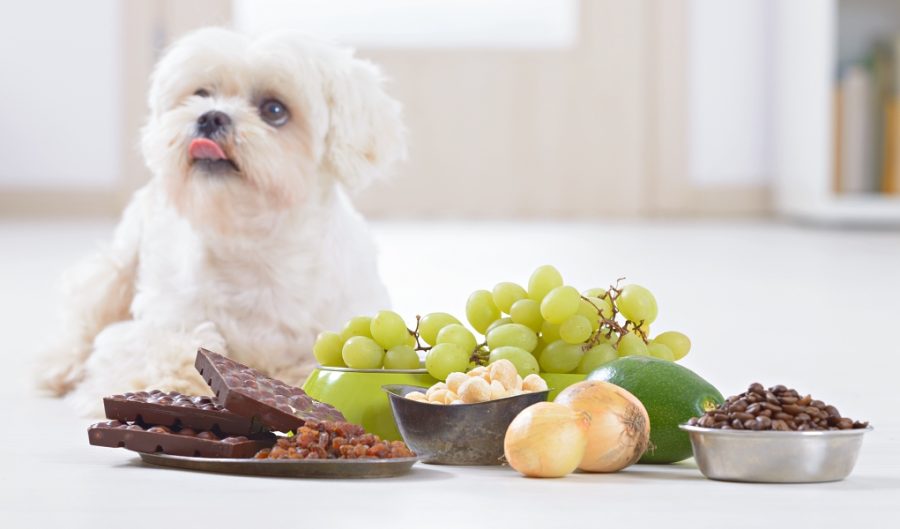Toxic Foods to Avoid Giving Your Pet
Little white maltese dog and food ingredients toxic to him
We all know how much our furry friends prefer eating our food rather than their own. They can never say no to what foods we offer them or may come across, which can sometimes pose a risk to their health. It is important to note that certain foods can be dangerous for pets and should be avoided at all times.
If your pet does get into any of these toxic foods you should immediately contact your nearest veterinarian or the ASPCA Animal Poison Control Center at (888) 426-4435 (a consolation fee may apply).
Listed below are the 8 most common toxic foods for your pet and the risk factors that come along with the consumption of these foods.
- Grapes and Raisins: As yummy, it can be for us, it is not the same for your furry friend. The common damage that these foods can do to your pet causes severe digestive issues. You have to be aware that their symptoms can vary, such as diarrhea, vomiting, and lethargy. Also, at times it can trigger acute kidney failure in cats and dogs.
- Certain Nuts: The nuts that you should avoid giving your pet include macadamia nuts, pistachios, almonds, pecans, and black walnuts. These small dry, single-seeded fruits contain high oil content, which can be beneficial for our health, but not your pets. Also, the size and shape of certain nuts can posses a choking hazard, even with or without their shell. By nuts having a high amount of fats and calories it can pose a risk for your pet to experience gastrointestinal issues, such as vomiting, diarrhea, and can lead to potential pancreatitis.
- Onion Family: It does not matter what condition (Ex. Raw, cooked, fried, or powdered) the onions, garlic, chives, shallots, or leeks are in because it is very harmful to feed your pet. Not only can this herb lead to gastrointestinal upset, but it can lead to developing hemolytic anemia (damage to red blood cells). A few signs of onion family toxicity to look out for are lethargy, weakness, decreased appetite, reddish urine, and pale gums.
- Dairy: Anything cheese-based might be an animal’s sweet tooth treat. Although, after I tell you what dairy can do to your pet, then you might want to think twice before giving them too much of it. Dogs and cats are lactose intolerant species; thus, they cannot digest dairy properly. By their bodies not having the capability of breaking down lactose in dairy products they can present with signs of diarrhea, vomiting, abdominal pain, bloating, and flatulence/passing gas if exposed to dairy.
- Avocado: This green fruit can be very dangerous to mainly our smaller breed pets (Ex. Birds, rabbits) and even our larger breed (Ex. Horses, donkeys, ruminants) pets too. The risk that can be possessed by feeding your smaller or bigger breed pet’s avocado is cardiovascular damage and/or even death. Typically signs of exposure to avocado in horses, ruminants, and donkeys can lead to serious health damage, such as edema, colic, respiratory distress, irregular heartbeat, and signs of neurological damage.
- Salty Snack Foods: Behind every delicious salty snack, there comes a high amount of sodium from the salt. Some snacks that are high in salt that you should mainly avoid giving to your pet are potato chips, pretzels, and salted popcorn. Consumption of salty snacks can possess the risk of sodium ion poisoning, excessive thirst, and urination. The typical signs that your pet can present if they consumed too many salty foods can include vomiting, diarrhea, tremors, elevated body temperature, seizure, or even death.
- Xylitol: Almost everyone has this product in their pantry as it is commonly used as a sweetener. Although, this may be the most dangerous toxin for your dog compared to cats and ferrets. The amount of consumption does not matter, overall, it can cause low blood sugar, liver failure, seizures, or even death in dogs.
- Chocolate: This sweet treat is not so sweet to give to your pet. White and black chocolate should be avoided at all times in giving to your pet, especially darker chocolate. Methylxanthine is a substance that is contained in cacao seeds, which is the main ingredient in making up chocolate and coffee. This substance is very dangerous when a pet ingests it as it can cause panting, hyperactivity, abnormal heart rhythm, seizures, vomiting, diarrhea, and even death.
Overall, make sure to be aware of what you are feeding your pet. Also, keep a close eye on what they are picking off from their surroundings that can potentially be toxic to their health. We always want the best for our furry friends and to always keep them safe. Hopefully with this list of toxic foods to avoid you can do that for them.

Gailen Leon is a Junior at Mercy College pursuing her B.S. in Veterinary Technology with a minor in Media Studies/Journalism. Ever since she was a child,...





